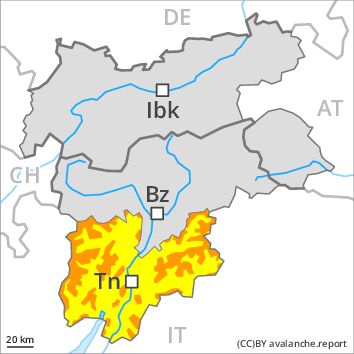Regions
Latemar, Southern Adamello, Primiero - Pale di S. Martino, Adamello - Presanella, Prealps, Northern Brenta - Peller, Cembra Valley, Bondone and Stivo, Vallarsa, Western Nonsberg Alps, Folgaria - Laverone, Southern Brenta, Fassa Valley, Sole, Pejo and Rabbi, Southern Lagorai, Ledro Valley, Northern Lagorai, Maddalene, Paganella, Marzola - Valsugana, Pine' - Mocheni Valley

Danger level
Avalanche Problem
Wind-drifted snow above the treeline, N-NE-E-SE-S-SW-W-NW
Gliding snow above 2400m, N-NE-E-SE-S-SW-W-NW

The wind slabs represent the main danger.
Ski touring and other off-piste activities, including snowshoe hiking, call for meticulous route selection, in particular on steep slopes above approximately 1800 m. Great caution and restraint are advisable. The more recent wind slabs are extensive and can in some cases be released easily. Single winter sport participants can release avalanches very easily, in particular on wind-loaded slopes. Below approximately 2400 m small and medium-sized gliding avalanches are possible.
Snowpack
The wind slabs are to be found in particular adjacent to ridgelines and in gullies and bowls and generally in the high Alpine regions. They are extensive and prone to triggering. In some cases the wind slabs have bonded still only poorly with the old snowpack. The old snowpack will be moist below approximately 2200 m. In steep terrain there is a danger of falling on the icy crust.
Tendency
Wind slabs represent the main danger. In addition an appreciable danger of gliding avalanches exists, in particular in the regions with a lot of snow in particular below approximately 2200 m.